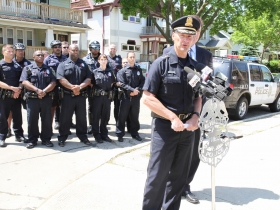The Ed Flynn Factor
Politico Magazine concludes Milwaukee is an innovator in policing. Why? Chief Flynn’s leadership.
The story is one the Milwaukee Journal Sentinel could have done anytime in the last few years, examining the tremendous impact Chief Ed Flynn has had on the Milwaukee Police. Instead the paper has concentrated on an endless run of gotcha stories on Flynn and has often seemed at war with him, while ignoring the big picture view of his nationally innovative leadership and leaving readers to assume he is a lousy chief.
So leave it to veteran writer Erik Gunn, a frequent free lancer for Milwaukee Magazine and the Madison weekly Isthmus, to let us know what is really going on. His story for Politico Magazine, “What Works: How Milwaukee Went Soft on Crime,” begins by noting the big decline in crime nationally over the last two decades, including in Milwaukee.
“But what makes Milwaukee stand out is not just that crime has fallen,” he writes, “but that it has done so in a town where 28 percent of the population falls below the poverty level, far, far above the national average, and where conventional wisdom has it that the entrenched problems that go along with such long-lasting economic deprivation make it much harder to do anything about crime. The secret? A reforming police chief named Edward Flynn who’s determined to make Milwaukee an unlikely textbook demonstration for just about every innovative policing idea out there.”
Among the changes that occurred under Flynn, the story notes:
-A massive improvement in the department’s data system so it provides timely information on crimes and trends in the city. Flynn went to the private sector and secured funding to make this happen.
-Bringing New York City’s CompStat model to Milwaukee. “Commanders gather every Wednesday afternoon to dissect data day-by-day and cop-by-cop… monitoring crime trends and then developing strategies in response.” This recently enabled the department to identify a network of more than 30 people who were responsible for well over 100 robberies and carjackings.
-More emphasis on community-oriented policing, whereby police get to know neighbors and neighborhoods, building trust so residents will share information about potential crimes and criminals. (Hence the story’s headline about going “soft on crime.”)
-Revising promotional standards to create more of a meritocracy in advancing people to higher command positions. “One consequence has been a decidedly more diverse group of commanders. The 1,800-member force is 35 percent minority; women make up 17 percent of the force. Of the three assistant chiefs, two are Hispanic and one is an African American female.”
-Greater use of bicycle patrols, which also provide closer contact between police and residents.
-Use of ShotSpotter, sensors placed throughout the most crime-ridden parts of the city to pinpoint the origin of gunshots so quickly that patrols can be dispatched to the scene in seconds. Flynn notes that only 14 percent of the shots detected with the technology had been called in to 911.
-“Members of the Homicide Review Commission now help ex-offenders get back on track once released into the community. The program began in two of the seven police districts and has since branched out citywide. Supplementing the work of parole and probation officers, police officers are tasked with making random visits to the homes of ex-offenders, guiding them on how to obtain high school-equivalency diplomas or how to find a job.”
In truth, Flynn has mixed measures to get tougher on crime through measures like shot spotter with “softer” efforts to connect police with residents. As Gunn notes, the fact that 86 percent of gun shots fired weren’t getting called into 911 shows the need for police to sell more residents on the need to relay this information to the department.
A key takeaway from the story: “The law enforcement theories, including problem-solving policing and community-oriented policing, used by Milwaukee have been around for a long time, conceptually, says Michael Jenkins, a criminal justice professor at the University of Scranton who devoted a chapter of his forthcoming book to Milwaukee. But many of these approaches ‘remained part of, at most, a small unit within a police department.’ Milwaukee under Flynn decided to employ the approaches across the board—in all parts of the department and all sectors of the city. The city, Jenkins says, is ahead of the curve on that score.”
Gunn doesn’t overlook problems that have occurred under Flynn, noting the death of Derek Williams in police custody, and the more recent shooting of Dontre Hamilton, a mentally ill, unarmed black man — two incidents that both outraged the community.
Flynn, for instance, notes that the idea of community policing was among the principles espoused by Sir Robert Peel, the British statesman and two-time prime minister who reformed police work in the United Kingdom in the early 1800s.
And Flynn, a believer in the “Broken Windows” theory (that small neighborhood disturbances lead to bigger crimes and must be taken seriously), offers this take on it: “It turns out that poor neighborhoods have the same damn values as the middle class: They want stability, order and peace and to not be afraid.”
There’s also a great quote that Flynn would probably like to take back: “We deal with critical incidents, violence, things go wrong and it turns into a tragedy. The military sometimes drops shells on the wrong village; we sometimes handle a critical incident in the wrong way.” (Hey, it could be worse, we could have dropped a bomb on your city.)
That quote aside, what Gunn’s story suggests is that Milwaukee is very lucky to have Flynn in charge. In a city with so much poverty, there are all kinds of accompanying social problems that can also lead to crime, and as Flynn has often noted, his officers become the social service agency of the first resort. Jason Smith, a captain in the Third District, one of the poorest sectors of the city, tells Gunn the police are not just in the crime business anymore. The mission is far broader: “We are in the housing business, the education business, the public health business.”
If you think stories like this are important, become a member of Urban Milwaukee and help support real, independent journalism. Plus you get some cool added benefits.
Back in the News
-
The State’s Richest Get Even Richer
![John Menard Jr. Photo by Travisvanvelzen (Own work) [CC BY-SA 4.0 (https://creativecommons.org/licenses/by-sa/4.0)], via Wikimedia Commons](https://urbanmilwaukee.com/wp-content/uploads/2020/09/John_menard_jr-1-e1630092418445-185x122.jpg) Oct 8th, 2024 by Bruce Murphy
Oct 8th, 2024 by Bruce Murphy
-
More Covid Crassness By Menards
 Aug 19th, 2024 by Bruce Murphy
Aug 19th, 2024 by Bruce Murphy
-
Grothman Keeps Causing Outrage
 Jul 22nd, 2024 by Bruce Murphy
Jul 22nd, 2024 by Bruce Murphy






















My brother-in-law is on the force, and he despises Flynn, as does much of the department. The recent no confidence vote seems to support his unpopularity with his staff. If he is such a great police chief, why is he so strongly disliked by his officers, especially if he’s gotten good results overall? I think he’s a pretty good chief, so maybe it’s the kind of job where it’s normal to be widely disliked as you’re making decisions every day that end up pissing someone off.
PMD i think it might be a good thing that most dont like him. Humans dont like change especially when it challenges the stats quo. Considering the history of the MPD change is probably exactly what was needed. Also consider the many cops lean right and their boss is chosen by a “lefty”
Yeah I can buy that explanation Casey.
PMD: There’s a question worth asking, although a definitive or reliable answer may be all but impossible to get (I tried, without success) : just how representative was that no-confidence vote, anyway? Police Union leadership says it was a far larger vote than most; MPD administration sources place it at the smaller end. Each has motivation to spin it.
And when was the last chief they liked, anyway?
Another thing to consider PMD, is the actions that Flynn took to shake up the force.
Cops with comfy central detective gigs get sent back to the streets (“Flynn began reassigning patrol-rank officers who had been working in the centralized detective bureau back to the districts”).
Police who became cops to police are now being tasked with a broader mission that they may consider a waste of time or not their job (“We are in the housing business, the education business, the public health business.”)
Cops are being held accountable for the crime that takes place in their district ( “Commanders gather every Wednesday afternoon to dissect data day-by-day and cop-by-cop”)
While these changes are effective, and are likely the right moves, they aren’t going to make you many friends with the force.
What would MPD want us to go back to – Jones? Arreola? The DeBraska era? At least Flynn is dealing with the blue wall of silence, and with the history of this department, not a bad thing to upset the status quo. I hope that he continues to innovate and bring the department into the 21st century, and that the Milwaukee Journal stops its silly “gotcha” attempts to discredit him.
Proof is in the tapioca, Flynn has been disaster. Artie Jones was better, numbers imnproved, ask the guys that were there.
Claiming Flynn has been a disaster contradicts all of the points laid out in this story. Where’s your evidence? What’s your proof?
I continue to be amazed at WCD holding up Arthur Jones as a great chief: Here’s what he was like as a chief: http://urbanmilwaukee.com/2001/09/09/murphys-law-why-chief-jones-wont-go-away/
So a 40% homicide clearance rate is an improvement over the decades long 80% and greater rate the Milwaukee Police Department had prior to Flynn. Yes that decentralization of the Detective Bureau is working great. The Captains may know what’s going on but the detectives and street officers don’t. We don’t have case management, no one dedicated to working the robbery crews that have committed more than hundreds of robberies since mid summer. The gathering of command staff isn’t why the 30 suspects were arrested for over 100 robberies. Nice that they take credit for the hard work done by detectives and officers who are not respected and supervised by people who only worry about the next command staff meeting. Yeah things are going great. Oh and don’t forget two of his Deputy Chiefs presided over District 5 while the finger in the butt officer was assigned there. Do you think it’s not lost on the rank and file that they were promoted in spite of that. So they were smart enough to get promoted and showed great leadership qualities, but didn’t know that one of their officers was repeatedly sexually assaulting the citizens of Milwaukee. Things are wonderful at the Milwaukee Police Department just ask Chief Flynn.
A metaphorical ‘poke’ is pretty common today, and that’s what Milwaukee citizens are getting if we aren’t told what the count was on the intentionally publicized ‘no confidence’ vote.
This quote from Moneyball explains why Flynn might be “hated” by some of his officers:
“It’s the threat of not just the way of doing business, but in their minds it’s threatening the game. But really what it’s threatening is their livelihoods, it’s threatening their jobs, it’s threatening the way that they do things. And every time that happens, whether it’s the government or a way of doing business or whatever it is, the people are holding the reins, have their hands on the switch. They go bat shit crazy.”
Sounds like Chief Flynn is doing an excellent job. The police union doesn’t like him because he is holding officers accountable. What’s not to like with Chief Flynn?
Milwaukee in top ten most violent for cities its size and one of the 50 most dangerous cities in world. aggravated assautls are measure.